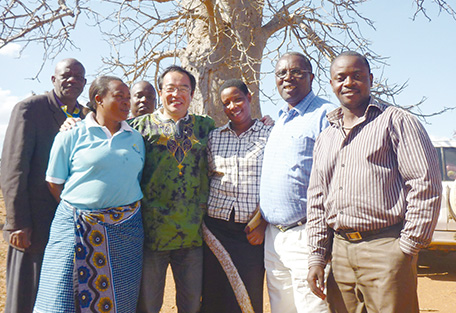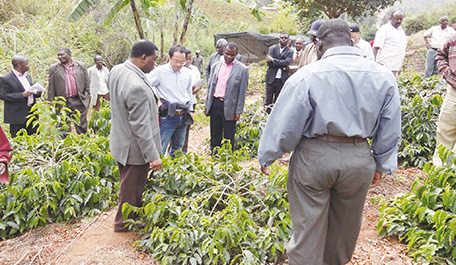Japan's Official Development Assistance White Paper 2013
Stories from the field 08
Creating Our Own System through Our Own Deliberation, Trial, and Error
– Supporting Local Government Reform in Tanzania –

Mr. Shimoda with facilitators in Mpwapwa District. (Photo: Michiyuki Shimoda)
The development policies pursued in Tanzania on its own after its independence hit a dead end in mid-1980’s. As a consequence, the country accepted a number of reforms proposed by donor countries and agencies, but it failed to achieve desired success, and continues to pursue development through trial and error. The government initiated decentralization reform in the midst of this process at the end of the 1990s. Since this was not an easy task, Tanzania requested technical cooperation from Japan. Upon this request, JICA Senior Advisor, Mr. Michiyuki Shimoda visited the country in 2002 to analyze the situation and design possible cooperation.
“The first thing that came to mind, frankly, was whether it was really alright for them to decentralize in such drastic and rapid ways. Moreover, when I participated in meetings on decentralization, I witnessed that the discussion was almost dominated by the donor countries. I felt that a major problem here was that the country was unable to think for itself and decide on its own way forward even on such fundamental issues for its own nation building.”
Mr. Shimoda explained the experience of Japan to the management of Prime Minister’s office Regional Administration and Local Government. After the Meiji Restoration, Japan learned from the Western systems, undertook a lot of national debates, and created its own system of “Half-Japanese, Half-Western” model suited to Japan through trial and error. Furthermore, after World War II, Japan rather took a “slow but steady” reform process nurturing the capabilities of its local governments first while pursuing economic development, and eventually proceeded to pure decentralization only in 2000. Mr. Shimoda proposed conducting training to enable the Tanzanian reform leaders to think about the best way forward by themselves and discuss among themselves so that they can develop the best-suited local government system for Tanzania.
In 2002, the JICA Training Programme known as “Osaka Training” was started inviting the top managements of the local governments such as Regional Administrative Secretaries (RAS) and District Executive Directors (DED). Participants learned about the local government system in Japan and its history; visited Ibaraki City in Osaka, Oita Prefecture, Minamata City in Kumamoto Prefecture, etc.; and observed the local administrative services and relationship with the residents. Mr. Shimoda tried to have the trainees convinced that it was possible to bring together the local governments and residents to come up with measures and policies.
An interesting thing happened when the group visited Oita Prefecture. The prefecture has been long promoting the “One Village, One Product (OVOP) movement” in which the prefectural government supports the local economic development suited to the respective areas by residents themselves, even in the poorest regions. In one community, the mothers from farming households managed to achieve tremendous success selling “karinto” (rustic fried wheat cakes). The group is now generously offering knowhow of business to people from neighboring communities who want to copy that success. And they were doing so regardless of the great drop in sales that it would bring about for their own products.
The trainees asked the leader of the group, “Are you happy with such consequences?” Her response was, “We are happier when everyone lives a little bit better together, rather than when only our group is making money.” Mr. Shimoda explained, “This is the spirit of Oita OVOP movement – ‘Not I, but we.’” The Tanzanian leaders responded with large nods of the head upon hearing this statement.
At the end of the Osaka training, many of the trainees stated that they wanted to convey what they had learned to their colleagues, thus the local seminars were held, organized by the Tanzanians, to share the knowledge from Japan across each region.
With that knowledge as a base, independent trials began to take place in each area. For example, in one local government, an initiative was begun to collect property taxes as a means of ensuring a stable source of revenue. In another district where the farmers had been growing the staple food of maize despite unsuited climate and soil, the local government started to think about whether there weren’t other crops more suited to their land. They managed to increase the cash incomes by recommending that they plant sorghum and sweet potatoes.
Through the initiatives of the Osaka training participants, Tanzania Osaka Local Government Reform Alumni Association (TOA) was established in 2006 comprising all RASs and DEDs (Council Directors) across the country where good practices of the respective local governments were shared.
In 2013, the new phase of Osaka training was started for a new generation of RASs and Council Directors. Mr. Shimoda has a view that the JICA’s support to the local government reform of Tanzania is a “snuggle up” model of support that might not be implemented by other donor countries, but could be carried out by Japan.
“For the governments of developing countries, given their extremely limited budgets and human resources, it is my firm view that they have no choice but to place greater importance on “self-help efforts” and initiatives of the community members, support them, and collaborate to improve those regions together. I also think that it will be a great contribution to the reform of many countries if we can form a national platform for the top bureaucrats from local governments like TOA in Tanzania, to share and discuss issues among them, which should lead to some effective policy recommendations to the national government. I believe that the way Tanzania achieved results based on their own ideas can surely be
applied to other developing countries as well.”

Mr. Shimoda observing coffee saplings together with regional government officials and staff. Villagers also participated. (Photo: Michiyuki Shimoda)
